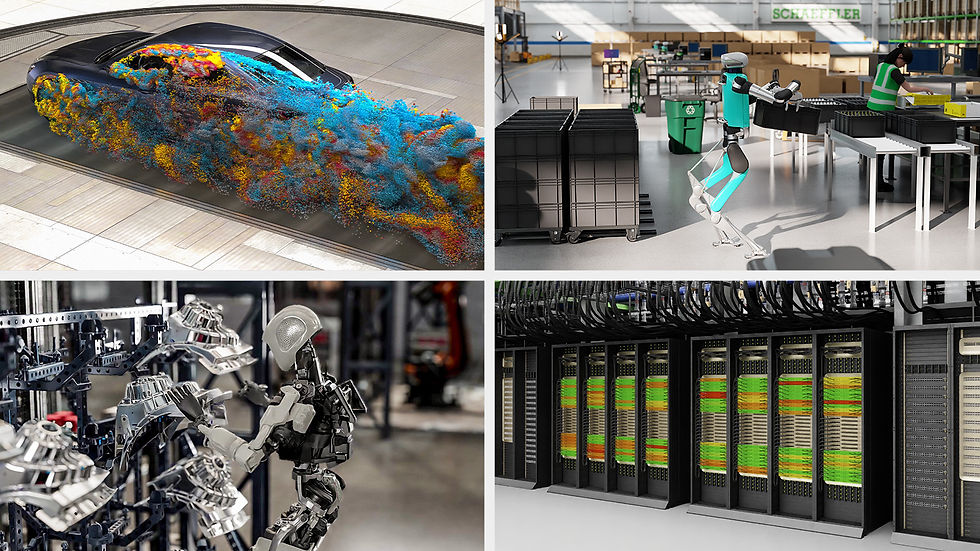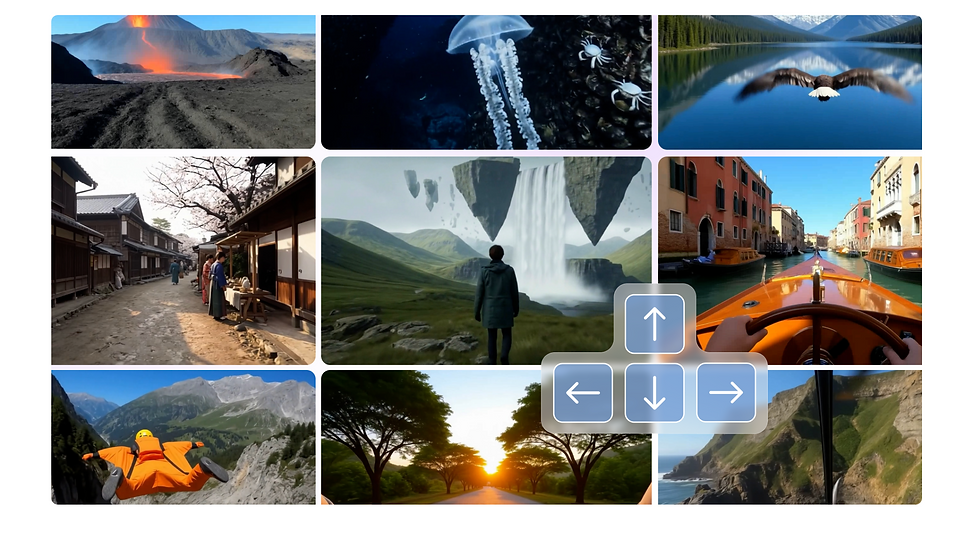AI Powered Metaverse: How Artificial Intelligence is Redefining Virtual Worlds in 2025
- Aug 12, 2025
- 6 min read

In the rapidly evolving landscape of digital innovation, the AI-powered metaverse stands out as a groundbreaking fusion of artificial intelligence and immersive virtual environments. This convergence is creating AI-powered virtual worlds that go beyond mere entertainment, offering unprecedented levels of immersion, interactivity, and personalization. As we navigate through 2025, the metaverse market is projected to reach approximately $150 billion, with forecasts indicating growth to over $800 billion by 2030, driven by advancements in AI technologies. This explosive expansion is fueled by major investments, including an estimated $54 billion poured into metaverse developments this year alone, highlighting its potential as the next digital frontier.
From gaming to enterprise solutions, the AI metaverse 2025 is reshaping how we interact, work, and socialize. Key players like Meta, NVIDIA, and Baidu are at the forefront, integrating AI to enhance user experiences and open new avenues for commerce and collaboration. In this blog, we'll explore how AI is powering these virtual worlds, key applications, leading innovators, challenges ahead, and the future outlook for metaverse trends in 2025 and beyond.
How AI Powers the Metaverse in 2025

Artificial intelligence is the backbone of modern metaverse platforms, enabling dynamic and responsive virtual environments that adapt to users in real-time. Core AI technologies include natural language processing (NLP) for intelligent virtual assistants, computer vision for realistic avatar interactions, and generative AI for creating expansive, ever-evolving worlds.
For instance, NLP allows users to converse naturally with AI-driven non-player characters (NPCs), making interactions feel lifelike and intuitive. Computer vision enhances avatar customization by analyzing user movements and expressions, while generative AI tools, such as those powered by models like GPT variants, can procedurally generate landscapes, buildings, and even entire economies within the metaverse. These technologies not only boost immersion but also provide tangible benefits: studies show AI integration can make experiences 40% more engaging, leading to higher user retention and satisfaction.
Moreover, AI optimizes backend operations, such as resource allocation in virtual spaces, reducing latency and improving scalability. In 2025, with the rise of edge AI and cloud computing, these systems are becoming more efficient, allowing seamless multi-user experiences across devices. This synergy is key to metaverse trends, where AI isn't just an add-on but the core engine driving innovation in AI-powered virtual worlds.
The Hardware-AI Symbiosis: Deepening Immersion

Crucially, the synergy between AI software and next-generation hardware is what brings these virtual worlds to life. Advanced headsets and haptic feedback suits are no longer passive peripherals; they are active data-gathering devices. AI algorithms process real-time biometric data—such as eye-tracking, heart rate, and even brain-computer interface (BCI) signals—to dynamically adjust the user's environment for unparalleled immersion. For example, AI can interpret a user's subtle emotional cues to alter the mood lighting in a virtual room or increase the difficulty of a game.This deep integration means the evolution of metaverse hardware and AI algorithms are intrinsically linked, each pushing the other to new frontiers of realism and responsiveness.
Key Applications of AI in the Metaverse
The AI metaverse 2025 is finding applications across diverse sectors, transforming traditional industries into interactive digital ecosystems. Here's a breakdown of the most impactful areas:
Gaming: Revolutionizing Play with Intelligent NPCs

Gaming remains the metaverse's powerhouse, with AI elevating experiences to new heights. Platforms like Roblox, boasting over 200 million monthly users, leverage AI for dynamic NPCs that learn from player behavior, creating adaptive storylines and challenges. In 2025, generative AI enables procedurally generated worlds, where environments evolve based on user actions, enhancing replayability and immersion.7
This isn't just fun—it's big business. AI-driven personalization has boosted player engagement by up to 30%, drawing in gamers seeking tailored adventures. As metaverse trends evolve, expect more integration with augmented reality (AR) for hybrid gaming experiences.
Enterprise: Virtual Training and Collaboration
In the corporate world, AI-powered metaverses are slashing costs and boosting efficiency. NVIDIA's Omniverse platform, for example, facilitates virtual simulations for training, potentially saving enterprises millions in real-world setup expenses. AI analyzes employee performance in these simulations, offering real-time feedback and customized learning paths.

By 2025, industries like manufacturing and healthcare are adopting these tools for remote collaboration, with AI handling complex data visualization and predictive analytics. This shift could reduce training costs by 50%, making it a staple in enterprise metaverse applications.
Social Platforms: Personalized Avatars and Interactions

Social metaverses thrive on AI for creating hyper-personalized experiences. Meta's Horizon Worlds uses AI to generate avatars that mimic users' facial expressions and gestures, fostering deeper connections in virtual hangouts. Generative AI also curates content feeds, events, and even virtual economies based on user preferences.
This personalization drives social engagement, with platforms reporting 25% higher interaction rates thanks to AI recommendations. In AI-powered virtual worlds, social interactions feel more authentic, blurring the lines between digital and physical relationships.
China's Role: Leading in Virtual Commerce

China is emerging as a metaverse powerhouse, with Baidu's XiRang platform serving over 50 million users through AI-enhanced virtual commerce. AI powers personalized shopping experiences, where virtual stores adapt to buyer habits, and blockchain ensures secure transactions.
Government-backed initiatives, including $2 billion in investments for smart cities integrated with metaverses, position China at the forefront. Chinese metaverse startups are innovating in AI-driven e-commerce, targeting 100 million users by 2026, making it a key player in global metaverse trends.
Top Players Shaping the AI Metaverse in 2025
Several tech giants are leading the charge in the AI metaverse 2025:
Meta: With over $10 billion invested in 2024, Horizon Worlds integrates AI for avatars and social features, aiming to dominate consumer metaverses.
NVIDIA: Omniverse powers 60% of metaverse developers with AI tools for 3D simulations, essential for enterprise and gaming.
Baidu: XiRang leads China's metaverse, using AI for commerce and social interactions, with ambitions for 100 million users by 2026.
Decentraland: This decentralized platform employs AI for user-generated content and economies, emphasizing blockchain integration for ownership.
These players are not only investing heavily but also collaborating to standardize AI protocols, accelerating metaverse adoption.
Challenges Facing the AI-Powered Metaverse

Despite its promise, the metaverse faces significant hurdles in 2025:
Data Privacy and Security: With AI collecting vast amounts of user data, 70% of users express worries about tracking and breaches. Solutions like privacy computing are emerging, but regulatory frameworks lag.
Ethical and Identity Concerns: Beyond privacy, the ethical landscape of the AI metaverse presents complex dilemmas. AI algorithms, if not carefully trained, can perpetuate real-world biases in avatar creation and social sorting, leading to digital forms of exclusion.13 The potential for AI-driven deepfakes and manipulative NPCs designed to influence user behavior raises profound questions about consent and reality. Establishing robust ethical frameworks for digital identity is a societal necessity to ensure these virtual worlds are fair and safe.
High Compute Costs: Building enterprise-grade platforms can exceed $1 million, limiting accessibility for smaller entities. Cloud AI optimizations are helping, but costs remain a barrier.
Accessibility Issues: Only about 30% of the global population has VR-ready devices, excluding many from full immersion. Efforts to support mobile and web-based access are crucial for inclusivity.
Addressing these challenges is vital for sustainable growth in AI-powered virtual worlds.
Future Outlook: Metaverse Trends Beyond 2025
Looking ahead, the metaverse is poised for transformative growth. By 2030, experts predict 50% of social media interactions will occur in virtual spaces, driven by AI advancements. China's $2 billion push into smart city metaverses will integrate AI for urban planning and services.
Emerging trends include AI-agent economies, where virtual assistants handle transactions, and hybrid AR/VR experiences for everyday use. With projections of up to $5 trillion in value by 2030, the AI metaverse 2025 is just the beginning of a digital revolution.
Conclusion
The AI-powered metaverse is redefining virtual worlds in 2025, blending cutting-edge technologies with practical applications across gaming, enterprise, social platforms, and beyond. While challenges like privacy and accessibility persist, innovators like Meta, NVIDIA, and Baidu are paving the way for a more immersive future. As metaverse trends accelerate, staying informed is key to capitalizing on this digital shift.
Follow AI News Hub for the latest updates on AI metaverse developments, emerging technologies, and expert insights. What are your thoughts on the metaverse's potential? Share in the comments below!
FAQs
What is the AI-powered metaverse?
The AI-powered metaverse refers to virtual worlds enhanced by artificial intelligence, enabling interactive, personalized experiences in digital environments for gaming, work, and social activities.
Why is it trending in 2025?
With surging investments and technological advancements, the metaverse is gaining traction due to its immersive applications, driven by AI innovations and market growth projections exceeding $150 billion this year.
Who are the key players?
Leading companies include Meta with Horizon Worlds, NVIDIA's Omniverse, Baidu's XiRang, and Decentraland's decentralized platform, each integrating AI to push boundaries in virtual worlds.



Comments